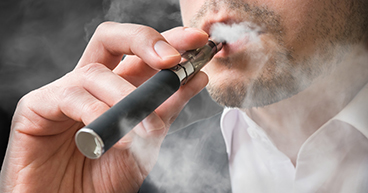
When the federal government banned flavored cigarettes in 2009, it made a very big exception for menthol cigarettes, which in 2021 accounted for 37 percent of all cigarettes sold in the country.
After more than a decade of additional investigation, the U.S. Food and Drug Administration (FDA) in April 2022 proposed prohibiting “menthol as a characterizing flavor in cigarettes,” and last October it sent a finalized version to the White House for its approval. The ban would also apply to flavored cigars.
Some researchers suggest a ban may play a significant role in reducing cancer risks. Not having menthol cigarettes available may keep some people from smoking in the first place, because it would eliminate the effect menthol has on masking the harshness of breathing in tobacco smoke. It also may reduce carcinogenic substance levels in people accustomed to smoking menthol cigarettes, who may not inhale as deeply when smoking regular cigarettes.
“Menthol cigarettes are easier to start with because the smoke doesn’t feel as burning or hot as a regular cigarette,” says Kala Bailey, MS LPC, a Behavioral Health provider at City of Hope® Cancer Center Chicago. “Menthol can increase the effects of nicotine, making it harder to quit.”
The Centers for Disease Control and Prevention (CDC) say those more likely to smoke menthol cigarettes are:
- Young people
- Racial and ethnic minority groups
- LGBTQ+ individuals
- Women
- Low-income individuals
- People with mental health conditions
Even if the White House approves the menthol ban, it may be several more years before it clears all the expected legal challenges from the tobacco industry. And even if it does take effect, there are ways of circumventing the new regulation in the works.
For instance, researchers at Yale University in an October report identified a synthetic flavoring agent called WS-3 that mimics menthol’s effects without being a “characterizing flavor.” Regulators may need to come up with new ways to address such odorless cooling agents, which are being used to try to get around statewide menthol cigarette bans in California and Massachusetts.
This article will look at the following:
- What types of cancer are linked to smoking?
- What’s behind the menthol cigarette ban?
- What is menthol?
- Why is the FDA banning flavored cigars?
- Could the menthol ban help reduce cancer rates?
If you’ve been diagnosed with cancer and are interested in a second opinion on your diagnosis and treatment plan, call us or chat online with a member of our team.
What types of cancer are linked to smoking?
It is well known that smoking tobacco is the leading cause of lung cancer, with nearly nine out of 10 cases attributed to smoking, but lung cancer is only one of many cancers that have been linked to smoking.
The CDC says smoking may lead to cancer “almost anywhere in the body.” It may cause “cancer of the mouth and throat, esophagus, stomach, colon, rectum, liver, pancreas, voice box (larynx), lung, trachea, bronchus, kidney and renal pelvis, urinary bladder and cervix, and causes acute myeloid leukemia,” according to the CDC.
“All of these cancers are challenging to deal with,” Bailey says.
Not only may smoking lead to cancer, it may also block your body’s ability to fight the cancer.
The poisons in tobacco smoke may damage DNA, creating abnormal cells that may grow out of control and create cancer tumors. The toxins may also weaken the body’s immune system, lessening its ability to kill the cancer and stop it from spreading.
The American Cancer Society says cigarette smoke contains thousands of chemicals, with at least 70 known to cause cancer. These toxic chemicals include nicotine, formaldehyde, arsenic and ammonia.
What’s behind the menthol cigarette ban?
The problem with menthol, regulators say, is it makes smoking more enjoyable for the smoker, masking the harshness of tobacco smoke.
Menthol in cigarettes typically makes smoking more appealing for first-time smokers, getting them to keep lighting up until smoking’s addictive qualities kick in. Menthol also interacts with nicotine, enhancing those addictive effects, making it harder for smokers to quit.
FDA regulators hope banning menthol in cigarettes will:
- Reduce the appeal of smoking to young people and lessen the likelihood they will move from experimenting with smoking to becoming regular smokers
- Decrease cigarette use among current menthol cigarette smokers and increase the possibility they will quit
- Reduce cigarette use among specific demographic groups, since nearly 85 percent of African American smokers use menthol cigarettes, as do 48 percent of Hispanic smokers and 41 percent of Asian American smokers
The FDA says a ban on menthol cigarettes may decrease smoking by 15 percent over the next 40 years in the United States, based on published research models. During that time, it’s estimated that up to 654,000 deaths related to smoking may be avoided by a ban, including up to 238,000 deaths among African Americans.
What is menthol?
Menthol is a chemical found naturally in peppermint and other mint plants and can also be reproduced in a lab.
When added to cigarette filters, menthol produces a minty taste and aroma while smoking. But menthol is not just a flavor. It has cooling, cough-suppressant, anti-irritant and anesthetic properties that contribute to its appeal.
It’s not only used in cigarettes, but also in other consumer products, such as throat lozenges, gum and candy, creating a cooling sensation that may also act as a painkiller.
“When inhaled, menthol can reduce airway pain and irritation from cigarette smoke and suppress coughing, giving smokers the illusion of breathing more easily,” the American Lung Association says. “However, despite what some marketing messages may seem to suggest, menthol cigarettes offer no health benefits compared to non-menthol cigarettes. In fact, the minty taste and odor can mask the early warning symptoms of smoking-induced respiratory problems.”
The presence of menthol in cigarettes may also get smokers to inhale more deeply, carrying nicotine and other toxic smoke chemicals farther into the lungs, says Georgetown University investigator Gerald Ahern, PhD, who studied the effects of menthol in a 2014 study. That deeper inhalation may increase the level of harm from smoking, Ahern suggests.
Why is the FDA banning flavored cigars?
For many of the same reasons the FDA has proposed banning menthol in cigarettes, and has banned other flavor additives in the past, the agency now wants to ban flavored cigars, as well.
Cigars come in a variety of flavors, such as strawberry, grape, cocoa and fruit punch. Though only a small portion of the population smokes flavored cigars, the FDA says they still have an impact:
- The 2020 National Youth Tobacco Survey found that about 3.5 percent—or 960,000—middle and high school students had smoked a cigar, cigarillo or little cigar in the preceding 30 days, with 58.3 percent of those users saying they had smoked a flavored cigar.
- More young adults tried a cigar for the first time each day in 2019 than a cigarette for the first time.
- An estimated 9,000 premature deaths annually are attributed to regular cigar smoking, with about 5,200 of those deaths involving cigar smokers who weren’t also cigarette smokers.
Could the menthol ban help reduce cancer rates?
Smoking is responsible for an estimated 30 percent of U.S. cancer deaths.
Critics of a menthol cigarette ban point to a 2011 study published in the Journal of the National Cancer Institute that found menthol cigarette smokers lit up fewer times per day than smokers of regular cigarettes. They also had a lower lung cancer incidence rate. Finally, the study found an equal likelihood of participating in a smoking cessation program among the menthol and non-menthol cigarette smokers.
“The findings suggest that menthol cigarettes are no more, and perhaps less, harmful than nonmenthol cigarettes,” the study concluded.
While the study looked at older smokers, it didn’t address the idea of menthol being a “gateway cigarette” to get young people into smoking.
Also, mortality statistics surrounding Black smokers illustrate an area where ban proponents see the potential for reducing cancer rates.
More than eight in 10 Black smokers use menthol cigarettes and they die of smoking-related illnesses at significantly higher rates than white smokers, from cancer, heart disease, strokes and other causes. Although Blacks account for 12 percent of the U.S. population, they account for 41 percent of smoking-related premature deaths, according to a 2021 University of Michigan study that looked at the impact of menthol cigarettes on Blacks from 1908 to 2018.
“Removing menthol can have the double effects of saving lives and reducing inequalities,” the authors say.
If you’ve been diagnosed with cancer and are interested in a second opinion on your diagnosis and treatment plan,call us or chat online with a member of our team.


